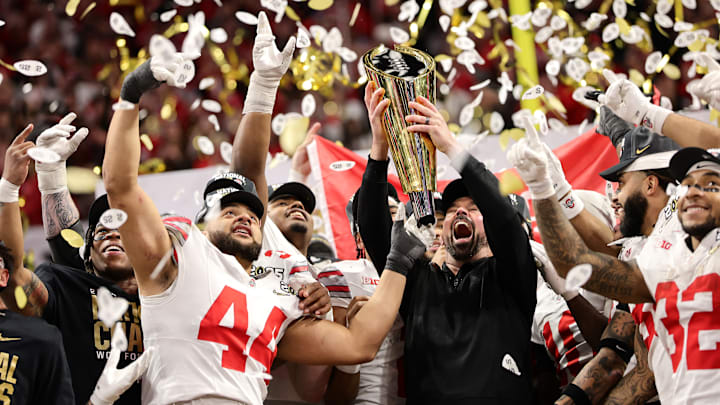The SEC and Big Ten are reportedly throwing their weight behind a brand-new 16-team College Football Playoff model that would upend everything the sport has worked toward with expanded access.
According to a report from Yahoo Sports’ Ross Dellenger, the proposal gaining steam would give both the SEC and Big Ten four automatic bids each. Not four potential bids. Four guaranteed spots. Every year. No matter how strong—or mediocre—their fourth-best team actually is.
Under the model being floated, the ACC and Big 12 would get two automatic bids each, the top Group of Five team would get one, and three additional at-large teams would round out the bracket. Oh, and there’s talk of “inner-league play-in games” between third and sixth, and fourth and fifth in the standings—presumably to keep more teams involved deeper into the season.
While on paper it might look like a clever way to keep fanbases engaged, let’s not sugarcoat it: It's alienating every single fanbase outside of the SEC and Big Ten.
Why the SEC & Big Ten Better Be Careful
Let’s start here—this model is an absolute mess.
The idea that the SEC and Big Ten should automatically get half the College Football Playoff field every year is not just misguided, it’s arrogant. Yes, the SEC has earned its respect. It’s put teams in the national title game year after year — except the last two years — and many of those have delivered in dominant fashion. But even then, four SEC teams in the Playoff every single season? Come on.
And then there’s the Big Ten, the conference that's desperately trying to flex like the SEC—but historically hasn’t backed it up the same way in the actual Playoff era. Since the CFP began in 2014, how often have there even been two Big Ten teams that clearly belonged in the field, let alone four?
Ohio State has carried the flag more than anyone, with Michigan emerging in recent years. But go year-by-year and try to identify four Big Ten teams that would’ve deserved a Playoff spot in the same season. You won’t find many. Some years, two would’ve been generous.
This format screams artificial legitimacy. It’s trying to lock in power rather than let the Playoff be decided on the field. Remember when we expanded from four to twelve because we wanted to give more deserving teams access? That’s already happening. A 12-team model allows for strong second-place finishers in deep leagues. It allows for a Cinderella run from the Group of Five. It gives the Playoff the energy of March Madness while still rewarding the best regular season in sports.
But this 16-team model? It’s a lazy shortcut. It says, “Let’s skip the part where you earn your spot and just reward you for your logo.”
That’s not what fans want. And it’s not what the sport needs.
What makes college football special is the fight for those spots. Every Saturday matters. Guaranteeing eight playoff spots to two conferences regardless of the quality of the teams cheapens that chase. It tells everyone else, “You’re not welcome here unless you get through the gauntlet and have the right branding.”
We’re already seeing public pushback. Big 12 commissioner Brett Yormark said it best when he warned against creating an “artificial championship.” And he’s absolutely right. We can’t crown champions who are rubber-stamped into the bracket just because they’re the third or fourth-best team in a bloated conference.
If anything, the 12-team format deserves a few more years to breathe. We’ve barely seen what it can do, and yet some folks are already trying to toss it aside for something that consolidates more power into the hands of a few.
The SEC and Big Ten should absolutely be proud of what they’ve built. But they need to be careful not to push too far. Because if they keep tightening the grip, they might find themselves holding a playoff that nobody else wants to be part of—and that fans stop caring about altogether.
They've got the power to do whatever they want, but just because they think it's best for them, doesn't mean it's best for college football.
